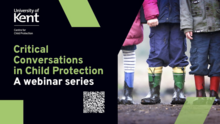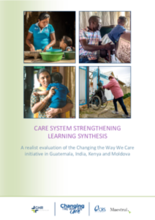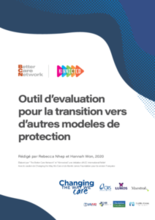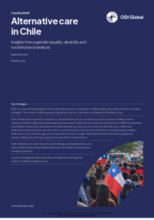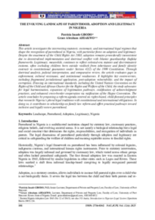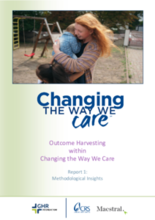Displaying 21 - 30 of 1025
CELCIS’ October 2025 webinar explored recent developments in residential child care across Scotland, featuring insights on nurture-based practice, shifts in inspection approaches aligned with The Promise, and staff development through reflective practice. Speakers highlighted how new care models, regulatory changes, and whole-system approaches are strengthening practice and improving outcomes for children and young people.
Countries that sign the Global Charter on Children's Care Reform are encouraged to make their own commitments describing specific actions they will take to realise the aims of the Charter. This guidance document aims to support governments to design ambitious, measurable, and context-specific commitments that align with the Charter’s principles.
At the close of the Changing the Way We Care (CTWWC) The Changing the Way We Care (CTWWC) initiative launched in 2018 with the aim to reform child care systems by promoting safe, nurturing family-based care over institutional ca
In this webinar, part of the University of Kent Centre for Child Protection’s ‘Critical Conversations in Child Protection’ series, Rebecca Smith and Geoffrey Oyat from Save the Children International, discussed the evolution of programs supporting family-based care and children without appropriate care, including unaccompanied and separated children, over the past thirty years.
This report presents findings from an evaluation by Changing the Way We Care (CTWWC) that used a realist approach to examine how care reform progressed in Guatemala, India, Kenya, and Moldova across five key system components. It identifies advocacy, government ownership, collaboration, and capacity-building as major drivers of change and offers recommendations for governments and partners to embed family care in national systems, strengthen coordination and workforce capacity, and sustain reforms through evidence, shared learning, and long-term commitment.
Cet outil vise à aider les praticiens à atteindre les objectifs suivants lorsqu'ils fournissent un soutien technique aux institutions en transition :
Changing the Way We Care (CTWWC) is a global initiative which promotes safe, nurturing family care for children.
This brief analyses the state of alternative care for children in Chile, highlighting key statistics, sectoral findings and areas for policy improvement. It is part of a broader analysis of gender equality, disability and social inclusion (GEDSI) in Chile. The analysis draws on existing literature, government reports and key informant interviews (KIIs) with stakeholders working in this area.
This article analyzes how Nigeria’s statutory, customary, and international laws intersect to shape adoption and legitimacy, revealing inconsistencies, cultural resistance, and systemic weaknesses that undermine children’s rights. It calls for legal harmonization and reforms grounded in child-centered and rights-based principles to create a more inclusive and secure framework for recognizing parenthood.
At the close of the Changing the Way We Care (CTWWC) The Changing the Way We Care (CTWWC) initiative launched in 2018 with the aim to reform child care systems by promoting safe, nurturing family-based care over institutional ca



